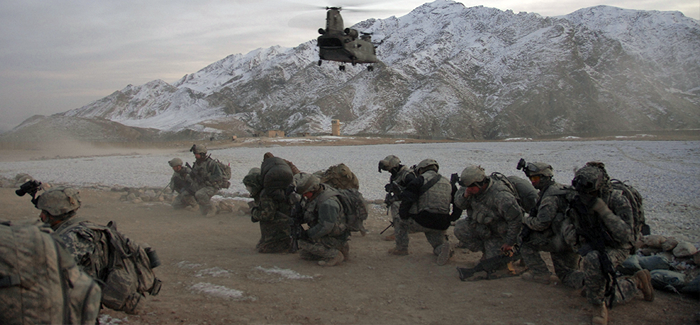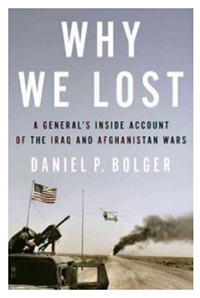
A CH-47 Chinook drops off troops in Afghanistan in 2009. (Department of Defense photography by Sgt. Johnny R. Aragon/US Army, released)
A retired general on learning from failures in Iraq and Afghanistan.
Lt. Gen. Daniel Bolger, AM’86, PhD’86, retired from the Army in June 2013 after 35 years of service. The last part of his career, from September 11, 2001, until his retirement, was consumed by the war on terrorism.

A three-star general, Bolger commanded US forces first in Iraq and then in Afghanistan. He made strategic decisions, led ground troops, and, along with his fellow generals, shaped the course of the wars.
To Bolger, the outcome of those wars is clear: we lost.
In his new book Why We Lost, Bolger offers a firsthand account of what went wrong in the Iraq and Afghanistan wars, laying much of the blame on military leaders like himself. He saw the ability and bravery of American soldiers misused when forces designed for short, decisive conflicts were sent into draining counterinsurgency efforts against a poorly defined enemy.
They were the generals’ wars to lose, he writes, and they did.
The Magazine’s interview with Bolger is edited and adapted below.
On writing history
As a historian, you always want an account from a person who’s a participant, a primary source. Although mine is not in the first person, it is a first-person account. Almost all of the anecdotes and the details in there are things I personally participated in, and many of the people in there are people I know very, very well from serving with them at the time of the incidents described.
Although as a Chicago-trained historian I’d be the first to tell you that you can’t write history on something that’s just happened, you do have to capture as much as you can about those events so maybe 20, 30, 40 years from now, somebody else can turn to those and try to figure out what happened. Because it takes a long time, really, to figure out exactly what happened and why. So if journalism, blogs, and things were the first cut, this is maybe a 1.5 cut as we’re figuring that out.
On the reaction from other military leaders
I’ve heard from a good number of people—generals, colonels, sergeants, majors I served with—who said, “Hey, I’m glad somebody said this. We have to raise this issue. We have to talk about it.” Obviously, it’s a tough thing to talk about in the service, because the last thing you want to say is, “OK, this didn’t go well, we lost, and it’s bad.” But I also know that our culture in the American military is we face up to reality. Sometimes it takes a while; that certainly happened after Vietnam. So I think there will be over time a recognition that we have to deal with this reality, of what’s happened in these two countries, and where we go from here.
On how we could have won
We would have had to define success differently than we did. The way we chose to define it, which was that we were going to create two countries that were democratic republics and strong allies of the United States against fundamentalist Islamic terrorists—we didn’t get there. Both countries are very weak and shaky, both of them have major insurgencies going in their terrain, and they can’t even deal with the terrorists inside their own borders, let alone help us with ones outside. But we could have defined victory a little more narrowly, been a little more circumspect in what we tried to accomplish. Certainly in Iraq, when Saddam was deposed, there were entities that were ready to step forward. Maybe we should have let them and accepted that the result might not be something that looks like Jeffersonian democracy, but it would be an Iraqi solution. And it might have even resulted in the split of the country, but if it’s their solution, it’s probably the right solution. I think we’ve certainly learned it’s very difficult for us to impose our solution on countries.
On the current fight against ISIS
So where I think we’ve learned some things is as the Obama administration has recommitted some forces there, they’ve carefully limited the mission. The Iraqis are going to have the lead for this fight. We’re going to advise them, we’re going to assist them, we’re going to do the things they don’t have the capabilities for, but basically we expect them to carry the bulk of the fight. So that’s a lesson learned because we tried it with over 100,000 of our troops in there, and that just didn’t work.
The other thing I think is better about how we’re handling this is, President Obama, and Secretary Kerry when he spoke to Congress, are talking about a multiyear effort. We’re telling the American people that this is not going to be over by the first of the year, it’s not going to be over by next summer, President Obama said it probably won’t be over in his administration. That’s a really realistic attitude, and it’s something that was lacking in the previous fighting in Afghanistan and Iraq, where we always seemed to think victory was just around the corner.
On why we need to keep talking
Hopefully when people read about the courage and commitment of our men and women who fought in this war, who are representing all of us, that will raise the issue of having a public debate about how much more of this do we want to do. Where do we want to do it, why do we want to do it, and how long do we want to do it? What cost are we willing to bear? That stuff cannot just be left to the people in the Pentagon or the State Department to sort of work out on their own and then report back. It’s too serious.
